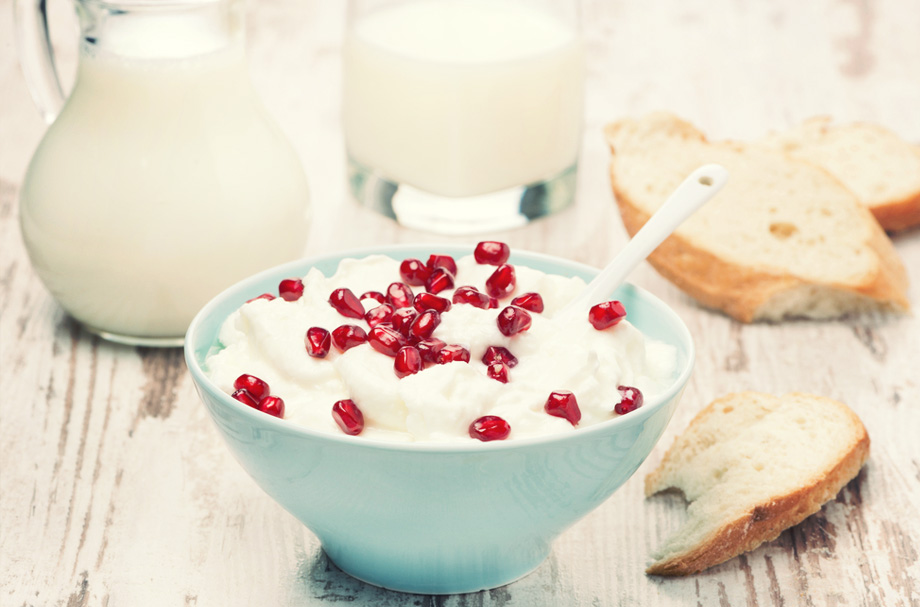- Taste of Good
- Our products
- Discover our Feta
- Our heritage
- Our recipes
- Wellbeing
- What’s new
- About us
- Farmers Portal
- International Websites
- Contact Us
- Baked Cheese Thins
THE EXPERIENCE
5 SURPRISING HEALTH BENEFITS OF YOGHURT
In cooperation with Dimitris Grigorakis, Clinical Nutritionist-Dietician, MSc Scientific Director of the Dietetic Support & Metabolic Control Centre APISXNANSIS - LOGO DIATROFIS, President of the Hellenic Nutritionists Society, www.logodiatrofis.gr, www.activekids.gr, www.care24.gr
5 surprising health benefits of yoghurt
Yoghurt consumption has long been celebrated for its health benefits. Without a doubt yogurt is considered a key component of the Mediterranean diet, mostly due to its beneficial nutrient profile (high protein, calcium and zinc content) and its well-established positive effects on health. More specifically, habitual yoghurt consumption can contribute to the following:
Prevention of osteoporosis: Yoghurt’s high calcium, magnesium and vitamin D3 content enhances bone mass and/or density and promotes skeletal health.
Intestinal health: Yoghurt contains beneficial microorganisms, also known as probiotics, which are formed after milk fermentation. These microorganisms regulate the balance of the intestinal microflora, which is of great importance for the proper functioning of the intestine and the prevention of gastrointestinal disorders. Moreover, bacteria of the genus Lactobacillus, which are present in significant amounts in yoghurt, have been shown to suppress the production of enzymes that promote the development and progression of tumors in the colon.

Immune health: Apart from their important role in skeletal health and the thyroid gland function, yoghurt’s calcium and vitamin D3 can also strengthen the body’s defense mechanisms. These nutrients are in fact necessary for immune system cells, and especially macrophages, which are responsible for the binding and neutralization of all foreign and pathogenic substances in the human body. Frequent consumption of fermented dairy products (such as yoghurt and sour milk) enhances the immune defense of the intestine, thanks to their high content in probiotics. More specifically, yoghurt’s probiotic bacteria strengthen the body’s defense against germs that cause food poisoning and restore the balance of the intestinal microflora. It is worth mentioning that besides probiotics dairy products’ high vitamin A and B-complex vitamin content (such as vitamins B1, B2 and B12) also promotes the health and proper function of the immune system.
Yoghurt has also strong antiseptic properties, due to the lactic acid it contains. Lactic acid is a substance that prevents both the fermentation and the absorption of toxins in the human body.
Weight loss: When dietary calcium intake is high, its concentration in blood increases, resulting in a reduced secretion of the hormone calcitonin. Calcitonin’s biological role includes the suppression of lipolysis (fat breakdown) and the promotion of fat (triglyceride) storage in adipose tissue. Consequently, a high calcium intake, followed by a reduced secretion of calcitonin, leads to the inhibition of fat storage and the enhancement and acceleration of lipolysis. It is therefore obvious that dairy products (such as milk, yoghurt, etc.), which are naturally rich in calcium, can significantly contribute to weight loss. Besides calcium, dairy products also contain other nutrients that boost lipolysis via a «collaboration» with calcium in a synergistic way, such as angiotensin-converting enzyme (ACE) inhibitors, branched-chain amino acids (BCAA) and casein.
References:
1. Chen Μ, Pan A, Malik VS, Hu FB. Effects of dairy intake on body weight and fat: a meta-analysis of randomized controlled trials Am J Clin Nutr (2012); 96: 4: 735-747.
2. Corthésy B, Gaskins HR, Mercenier A. Cross-Talk between Probiotic Bacteria and the Host Immune System J. Nutr. (2007); 137:3: 781S-790S
3. Greer FR, Krebs NF. Optimizing Bone Health and Calcium Intakes of Infants, Children, and Adolescents. Pediatrics (2006); 117: 2; 578 -585.
4. Lourens-Hattingh A, Viljoen BC. Yogurt as probiotic carrier food. International Dairy Journal (2001); 11: 1–2: 1–17..